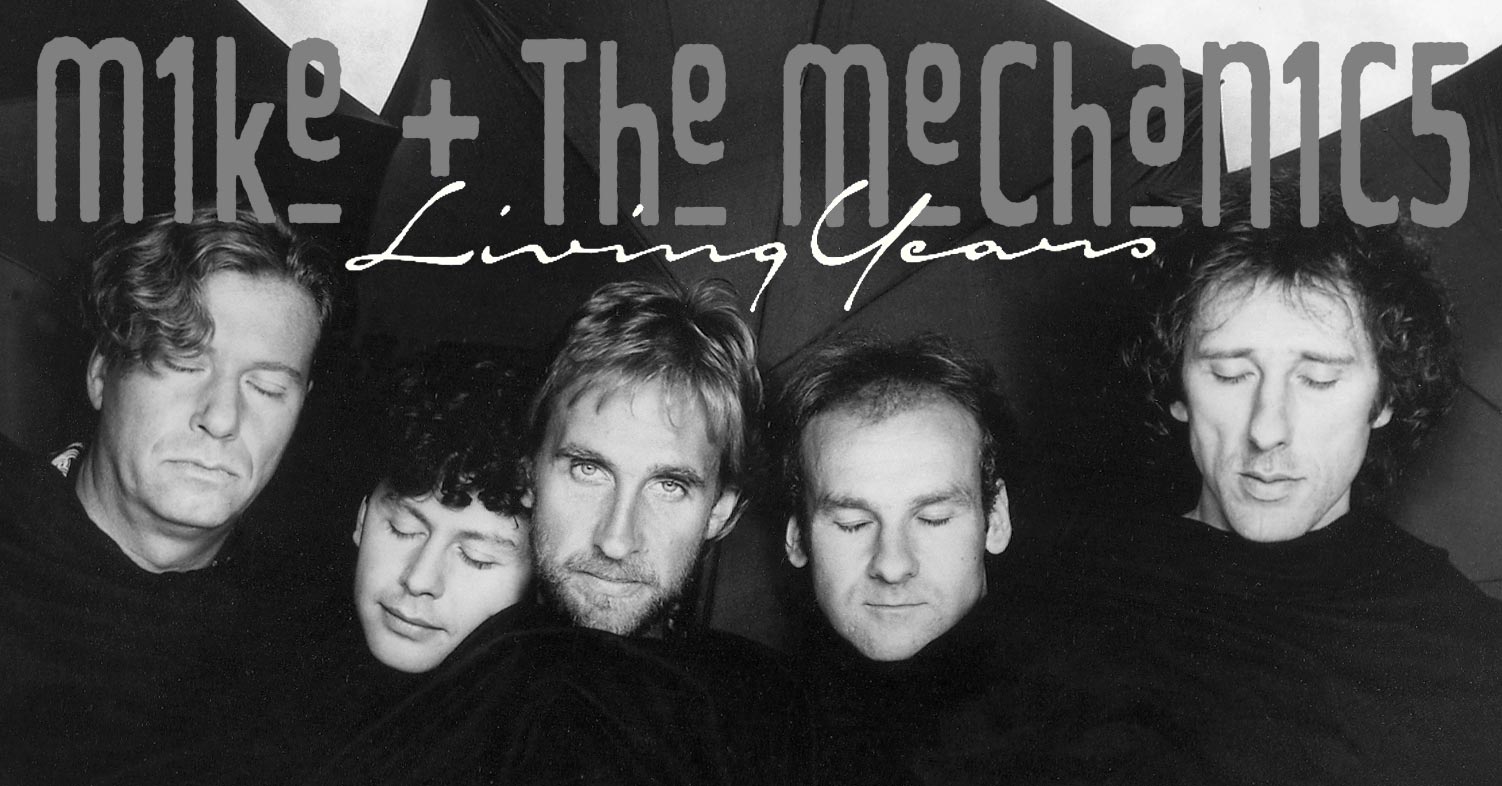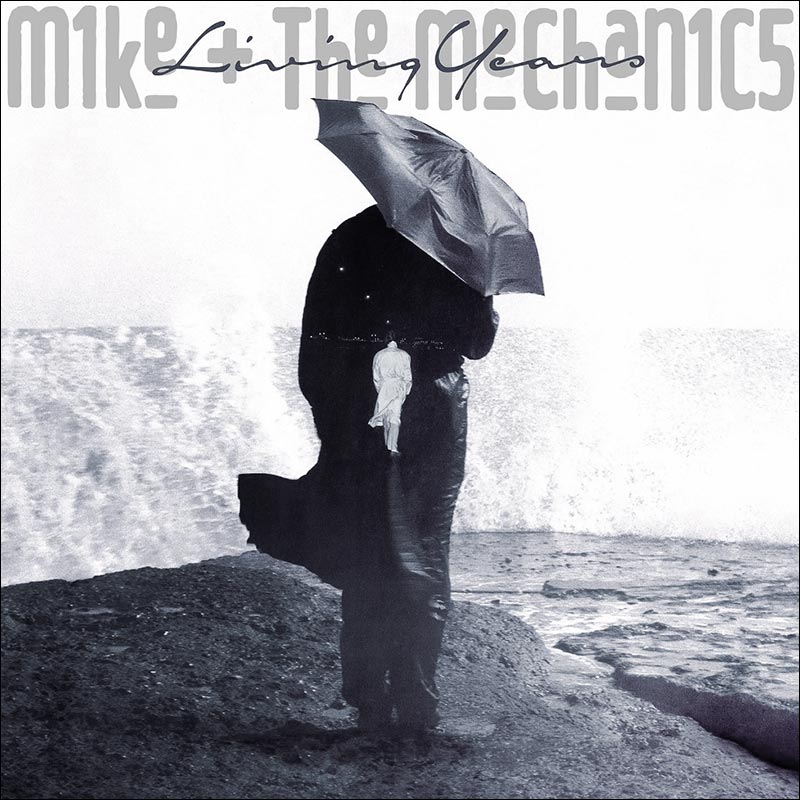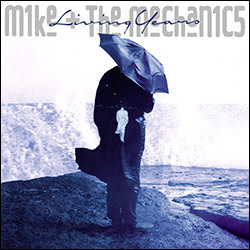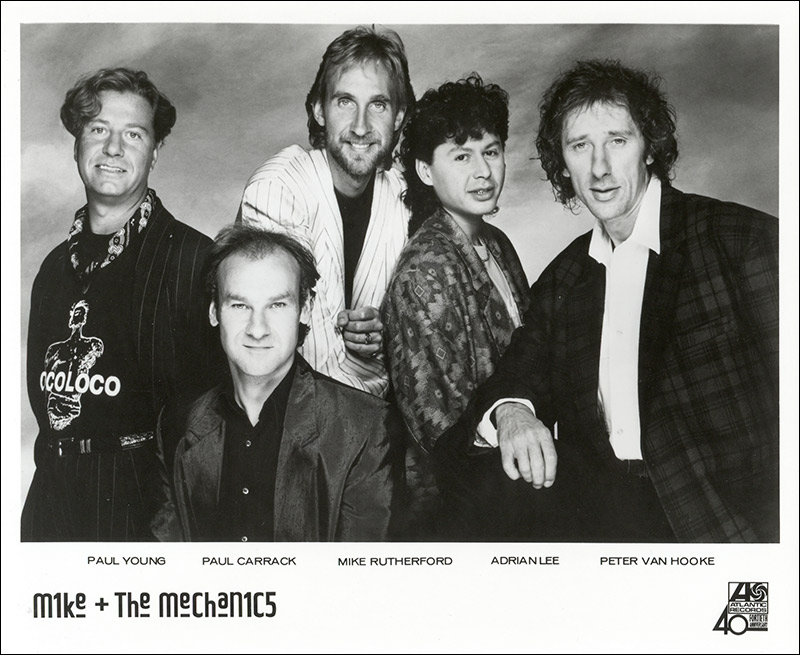


The second album by Mike Rutherford and his Mechanics was released (depending on where you are on the world map) between 14 November 1988 and February 1989, and was once again a chart success (UK #3; US #13, Germany #16). The album went Gold in the UK, USA and Canada, making it the band's most commercially successful album (apart from the compilation Hits).
Also included is the most successful single Rutherford released outside of Genesis. It was not the first single in October 1988: Nobody's Perfect (UK #80; US #63), but the song The Living Years, which was released between the end of December and February and reached #13 in Germany, #2 in the UK and went to #1 in the USA.
Finally, Seeing Is Believing (US#62) was released in April and Nobody Knows (UK#81) in May/June.
In addition to Mike Rutherford, Adrian Lee (keyboards) and Peter Van Hooke (drums), as well as vocalists Paul Young and Paul Carrack, the album featured a number of guest musicians on keyboards and percussion. Alan Murphy on guitar, perhaps best known for his work with Kate Bush, who died just one year later, also played on the album. The album was produced by Mike Rutherford and Christopher Neil.
About half of the songs were written by Rutherford and B.A. Robertson and the other half by Rutherford and Neil. Paul Young also gets songwriting credits on two tracks.
The songwriting began in 1987 with Rutherford feeling uninspired after the death of his father and the difficult birth of his third child. This changed, however, and the album was recorded in the summer of 1988.
For comparison, here are a few albums that were also released in late 1988/early 1989: Green by REM, Look Sharp! by Roxette, Everything by The Bangles, Introspective by the Pet Shop Boys, Mystery Girl by Roy Orbison and The Raw & The Cooked by the Fine Young Cannibals.
This pretty much defines the framework in which Mike and the Mechanics moved: between rather simple hit parade pop and somewhat more sophisticated handmade rock.
Tracklist:
 CD1:
CD1:
01 Nobody's Perfect
02 The Living Years
03 Seeing Is Believing
04 Nobody Knows
05 Poor Boy Down
06 Blame
07 Don't
08 Black & Blue
09 Beautiful Day
10 Why Me?
CD2 (Bonus-CD - Release 2014):
01 The Living Years 2014
02 Seeing Is Believing (live)
03 Don't (live)
04 Black & Blue (live)
05 Silent Running (live)
06 Par Avion (live)
07 Take The Reins (live)
08 Nobody's Perfect (live)
09 A Call To Arms (live)
10 Beautiful Day (live)
11 Hanging By A Thread (live)
This review is about the 2CD version released in 2014, which was re-released in 2018 as part of a box set that also included vinyl. It was released in 2014 shortly before Mike Rutherford's autobiography The Living Years (the German title was (translated) Rhythms of Life). It is not without reason that the book bears the same title, but it should be noted that the book title was not chosen because of the great success of the single of the same name. On the contrary, only a few pages of the book are devoted to the album.
 Unfortunately, the album cover on the remastered version is pale blue instead of black and white. The spraying is barely visible. The overall impression was definitely better before, even though the idea of a small, light person in the middle of a large, dark person exposed to the weather with an umbrella is a good one, but the graphics were already unconvincing before.
Unfortunately, the album cover on the remastered version is pale blue instead of black and white. The spraying is barely visible. The overall impression was definitely better before, even though the idea of a small, light person in the middle of a large, dark person exposed to the weather with an umbrella is a good one, but the graphics were already unconvincing before.
The liner notes for the new release have been written by Mario Giammetti. The content includes a brief history of the band, an interview with Mike about the album and comments on some of the songs.
Track by Track:
Nobody's Perfect begins with keyboard sounds that sound like someone banging on bottles and cans. It's a little irritating at first, a rough introduction to the album. However, the song quickly turns into an atmospheric pop-rock song with some good guitar parts, very haunting vocals and clearly audible keyboard carpets in the chorus. After the first solo and a hesitant middle part you are well prepared for the album.
Everybody knows The Living Years. The guitars here are definitely reminiscent of Genesis from the Abacab era onwards, while the sensitive vocals, choirs and keyboard backing give the whole thing an instrumentation appropriate to the lyrics. The song is about the death of one's father and the feeling of being a stranger to him. It was co-written by Rutherford and Robertson, although Rutherford - whose father had died a few months earlier - had nothing to do with the lyrics. And he was initially unsure whether the subject matter was too heavy for a pop song. It is also understandable if some people find the song too shallow. The song was nominated for several Grammys and was later covered by several other artists.
Seeing Is Believing clearly takes us back to the 80s. In addition to the drums, which sound like cardboard, the bass sounds very synthetic. This is supported by a lot of keyboards and a scratchy guitar that sounds very weak. So it has to be said that this song seems outdated today, or at least typical of the time.
For me, Nobody Knows is the second part of The Living Years: similar in mood, even if it is about relationship problems. The soft keyboards dominate and the song is garnished with appropriate guitar dabs, which then even pushes forward a little more in the chorus, mainly because the vocals and drums now have much more to say in the mix. There is a small quasi-guitar solo in the bridge and all in all it can be described as a nice pop song.
Poor Boy Down is much more dynamic. A fat synth rhythm, keyboards in the foreground and more powerful drums introduce the song. In the verse and chorus the guitar is in the background, but the powerful vocals are very appealing. It's actually a dance song with a funky disco feel, which makes you wonder why it wasn't released as a single.
As far as the instrumentation is concerned, Blame is obviously oriented towards the (then) current synthpop acts. There are hardly any guitars to be heard - apart from one solo. The vocals are once again very much in the foreground and the drums drive the song forward. However, as it is still not particularly catchy, it can probably be described as idiosyncratic.
In Don't, the drums sound programmed, as does the bass. The presumably intended build-up of tension with calmer verses and pompous choruses doesn't work for me at least. Ultimately the weakest track on the album.
Black & Blue has an organic-sounding bass, lots of background choirs and emotional vocals. It comes across as soulful and is a little out of the ordinary. I can really imagine this track on a Paul Carrack solo record, even though Paul Young is actually singing here. It also contains a sample that Tony Banks had previously recorded with Genesis. Later, Rutherford was no longer entirely convinced that the song really worked.
Beautiful Day continues as before, at least as far as the synthesised bass and drums are concerned. At least there are some good guitar chords (and a solo later on) and the vocal melody is catchy. So it's a good pop song that unfortunately fades out a bit unmotivated.
Why Me? is the longest track on the record, an anthemic song that is most reminiscent of Genesis material. In addition to Carrack's good vocal performance, the song has an epic quality, even though the instrumentation consists mainly of keyboards and effects.

Overall, there is no doubt that the disc has a relatively consistent sound and two excellent singers. A melancholy mood pervades the songs, but at the same time it is music from the 80s, which can be recognised by the drum sound and the many keyboards. Whether this as a whole is still interesting for the new listener today is doubtful. Back then, however, the album radiated its own atmosphere and was definitely worth listening to for anyone interested in the Genesis environment.
Does the album sound different in 2014? First of all, it should be said that this is a remaster, not a remix. Opinions on the internet vary widely, with some saying that the remaster either emphasises the album's strengths or ruins it. I don't think the difference is significant, so I'm levelling off in the middle: the remaster offers neither decisive advantages nor disadvantages compared to the original version.
As there is no live album by Mike + The Mechanics yet, fans can now enjoy one with the second CD. Unfortunately, it is not stated which concerts the songs are from. In the it-interview Mike said that they were concerts in the USA.
But first you hear the new version of The Living Years, which is a remix with new backing vocals and most importantly the new vocals of Andrew Roachford, who was now the lead singer of the Mechanics. The new recording features a mystical intro and also differs from the old version in the use of sweeping electronics and a choir. But this does not hide the fact that Roachford is not able to give the song the same intensity as Carrack. Neither the gospel touch nor the pimped effects do the song any favours. At least not if you've heard it before.
The sound of the first live songs is not ideal, not a Walkman recording, but comparable to less well mixed radio concerts. From Silent Running onwards, everything sounds a bit more balanced in the mix. You can hear rockier, more real drums, generally more of a band feeling than in the studio recordings, sometimes a bit noisy, but the contrast to the studio version is interesting. On the other hand, it sounds less typical of the time (i.e. less late 80s). So it can be said that the live songs are enjoyable because of the difference to the studio version, without being directly better than the original versions.
You might wonder why the B-sides of the singles are missing. Shortly before, the compilation The Singles 1985-2014 was released, on the second CD of which you can find all the band's B-sides. Very good!
However, the different versions of the songs are not included, so the single version, the edit version and the extended version of Nobody's Perfect are missing and the edit of Nobody Knows is missing. There was also a live version of I Get The Feeling on one of the singles, which is not the same as the one on The Singles 1985-2014.
Harald Köhncke
(October 2020)



Self-titled album, though some call it M6. The last album with Paul Young, who died in 2000.
Review available